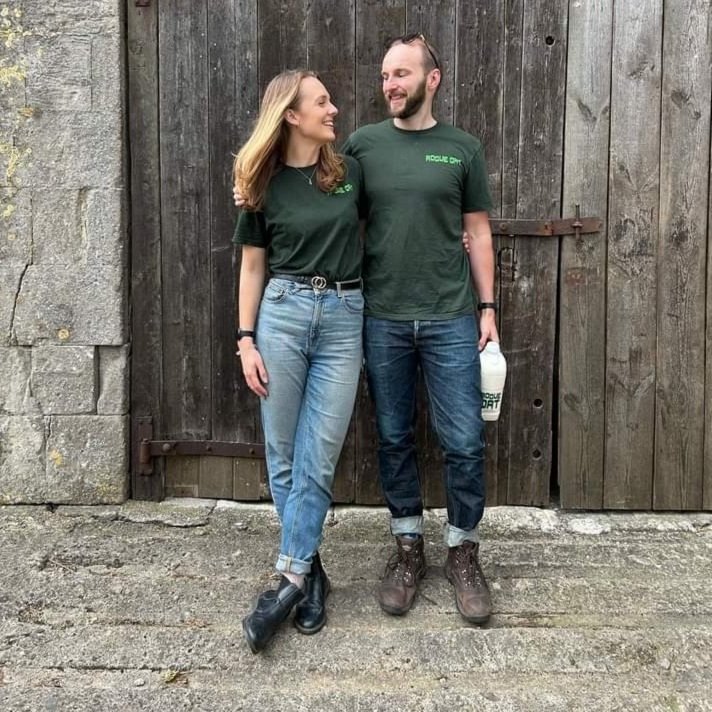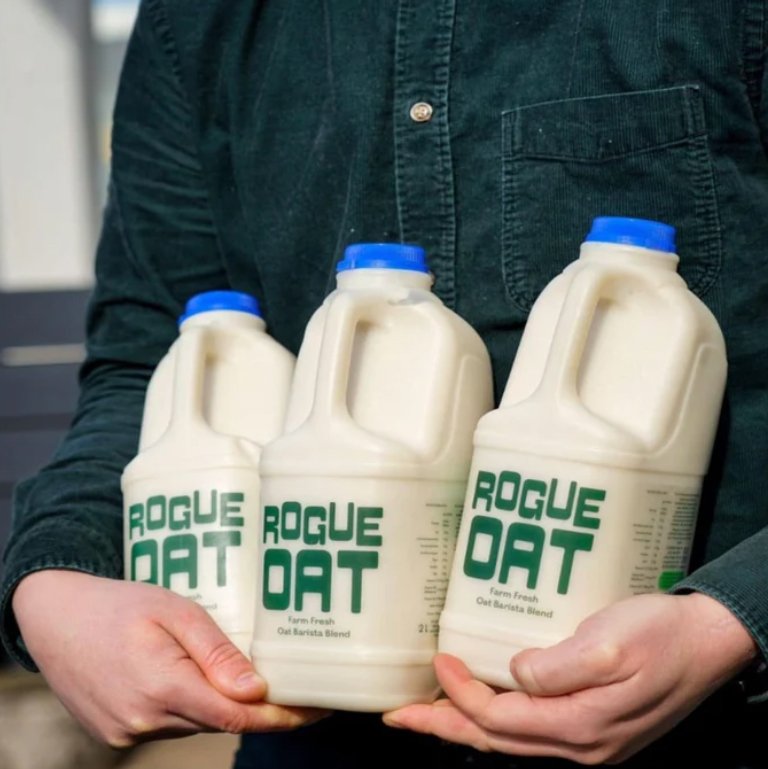Studio Every Conversations: Joe & Flo from Rogue Oat, with Kelly from Studio Every
We caught up with Rogue Oat. A new oat milk brand, making waves in the alt-milk market. Unexpectedly, Rogue Oat is an idea that stems from a dairy farm.
To the founders, plant-based eating couldn’t be ignored, and where the future of British farming fits into that story.
Rogue Oat is a third-generation family of farmers in the Cotswolds, UK. They know the world of agriculture, and they
think big! Thinking beyond the product, to consider the total eco-system for a more sustainable future. They’re delivering everyday products and doing good for the planet.
1. Can you share how Rogue Oat came about?
Rogue Oat was the result of many chats around the family dinner table about how farming fits into the wider conversation around sustainable consumption.
We (Flo & Joe) are passionate that farming is absolutely key to helping us all consume more sustainably and felt that that story was not being shouted about.
2. What inspired the brand and the name?
Rogue Oat is a farming term for an oat growing in an unexpected place. Our oat drink that sprouted on a dairy farm is just that.
3. With a big oat and alt-milk market now established, what is your point of difference to stand out and encourage people to purchase Rogue Oat?
We make Rogue Oat fresh on our family farm and pack it into traditional dairy packaging such as 2L bottles. Not only is it genuinely all made on the farm, it also means we do not need to ultra heat treat Rogue Oat and package it into tetra paks. This reduces waste, energy consumption and whilst retains a fresh taste and great steaming for baristas!
4. One of your principles is to keep waste to a minimum. Can you explain more about how you do that?
We package Rogue Oat into 2L bottles which is double the size of the industry standard of 1L. We have heard so many stories of cafes filing their bins with tetra paks which are difficult to recycle.
Our HDPE bottles really are curbside recyclable and offering larger pack formats helps to reduce this even more. We are now offering a 10L pack size too! On top of that, once we finish with the oats, we feed them to our cows who in turn fertilise our fields.
“Once we finish with the oats, we feed them to our cows who in turn fertilise our fields”
5. We believe at Studio Every that plastic packaging has got a bad rap, and people have overlooked its sustainability credentials.
Can you share more about your packaging journey and where you have arrived at?
We’ve gone round in circles about this one too. It seems to go against everything we’ve heard. Plastic = bad. Right?
So when we set about looking into the most sustainable option for packaging Rogue Oat we found time and time again plastic milk bottles came out on top.
Why?
1. Plastic bottles ensure a longer shelf life.
2. Plastic milk bottles have a total lower carbon emissions than the equivalent glass bottle. Research shows that from a carbon perspective, glass bottles need to be recycled at least 20 times. In practice, most glass bottles only survive being reused 18 times.
3. Plastic bottles need less protection when transported, so vans can transport more in one go.
4. Plastic allows bigger pack sizes, meaning you can get more Rogue Oat in one bottle.
6. Good for you, good for all is your mantra - how are you delivering on this?
We try our best to deliver on it in everything we do. We use solar energy and wood pellets for most of our energy requirements and our water comes from our own Cotswold bore well. We feed the spent oats to our cows who in turn fertilise our fields.
On top of that, we personally think that drinking Rogue Oat is a total pleasure and once that is good for you. Our preferred method is in a flat white but that is up to you!
7. Could you see a world when oat milk is more affordable than cow’s milk? Sustainability often comes at a cost to the consumer. What will it take to level out?
This is a hard question to answer quickly. In truth, we feel that dairy milk has been driven down in price to the point where it is incredibly difficult for small family British dairy farmers to operate in a financially sustainable way. It is not impossible, but many small producers have been forced out of the industry because of this. We have seen many farming families leave milking cows for this reason. We hope that prices will level out one day to a place where they work for consumers and producers no matter if it is dairy or alt milk.






